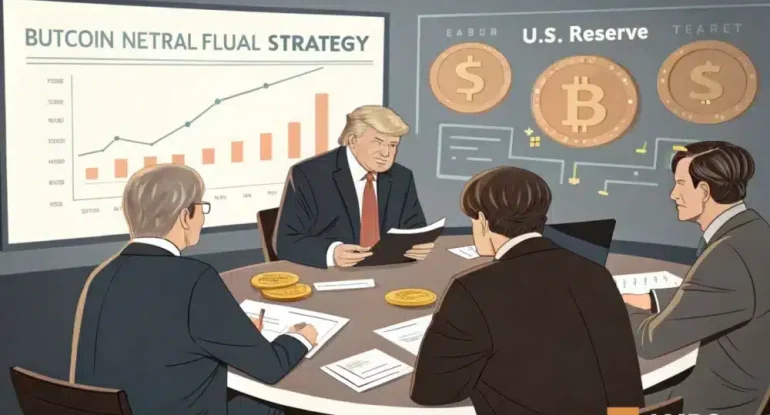Bitcoin Reserves: US to Establish Fund, No Taxpayer Funds

- The U.S. is making a notable move: planning to accumulate Bitcoin, and surprisingly, without using taxpayer money.
- This initiative, known as the Strategic Bitcoin Reserve, signals a significant evolution in the U.S. economic approach, embracing digital assets in a big way.
Bitcoin [BTC] has been the hot topic of 2025, sparking debates from all sides about its growing influence.
Fueling this conversation is the return of President Donald Trump to office, which has had a pronounced effect on the cryptocurrency scene, both domestically and worldwide.
Bo Hines Sheds Light on the U.S. Bitcoin Strategy
In what’s being seen as a significant step forward, Bo Hines, the executive director of the Presidential Council of Advisers for Digital Assets, recently unveiled that the U.S. government is actively looking into methods to accumulate Bitcoin without dipping into taxpayer funds.
Speaking at the Blockworks Digital Asset Summit 2025, Hines underscored that this move is in line with President Trump’s campaign pledges and also recognizes Bitcoin’s increasing importance in the global financial system.
As Hines stated,
“We’ve been exploring ways to acquire more Bitcoin in budget-neutral ways. Our goal is to get “as much as we can get.””
He elaborated further,
“We’re delivering on the promises President Trump made during his campaign. He was very serious about establishing the Strategic Bitcoin Reserve. We wanted to make absolutely sure we did it the right way – in a manner that respects Bitcoin’s unique nature, and also acknowledges the innovation happening in other areas of the digital asset space.”
The Reasoning Behind This Change?
The unveiling of the Strategic Bitcoin Reserve indicates a significant transformation in how the U.S. government views digital assets.
Historically, the cornerstone of central banks and national reserves has been gold and foreign currencies, considered essential for maintaining solid financial footing.
However, with Bitcoin gaining traction as a valuable asset, the current administration has begun to see it as “digital gold.”
Expanding on this perspective, Hines clarified,
“When we look at Bitcoin, we see it not as a security, but as a commodity—an inherently valuable asset that has historically been recognized as such.”
As the U.S. ramps up its efforts to accumulate Bitcoin, this strategy is under close examination, both at home and abroad.
While the administration is dedicated to a budget-neutral approach to avoid burdening taxpayers, the specifics of how this will be implemented are still to be determined.
International Concerns Regarding Trump’s Bitcoin Reserve
In the meantime, prominent European financial figures, such as Francois Villeroy de Galhau of the ECB, have expressed apprehensions about possible worldwide consequences. They cautioned that financial crises frequently start in the U.S. and then spread across the globe.
Therefore, as the U.S. refines its Bitcoin reserve plan, its ultimate outcome – whether success or failure – could leave a long-lasting mark not only on the U.S. economy but also on the entire global financial system.











